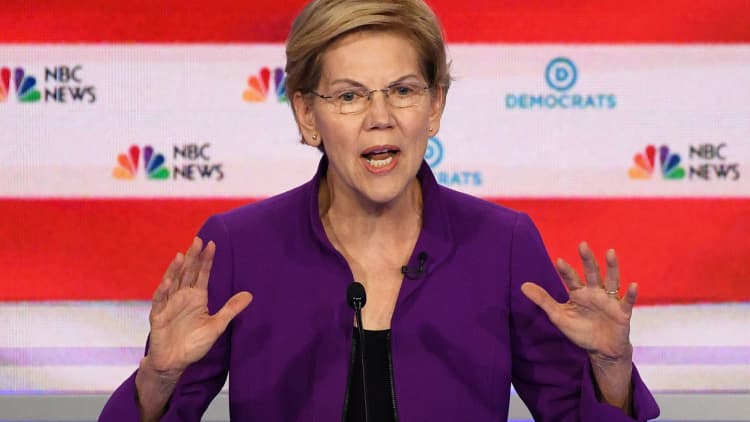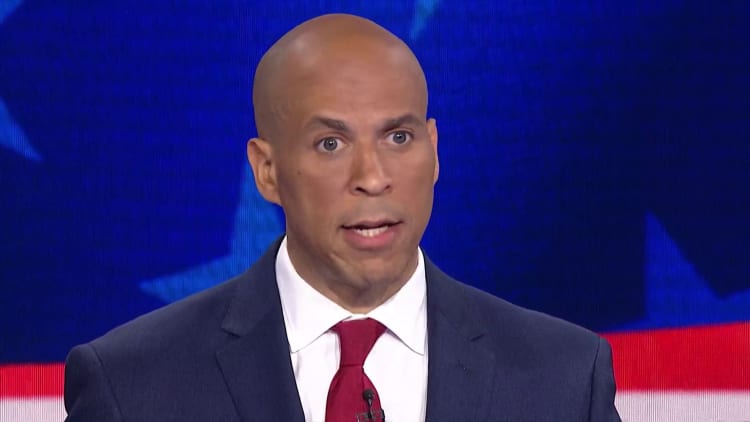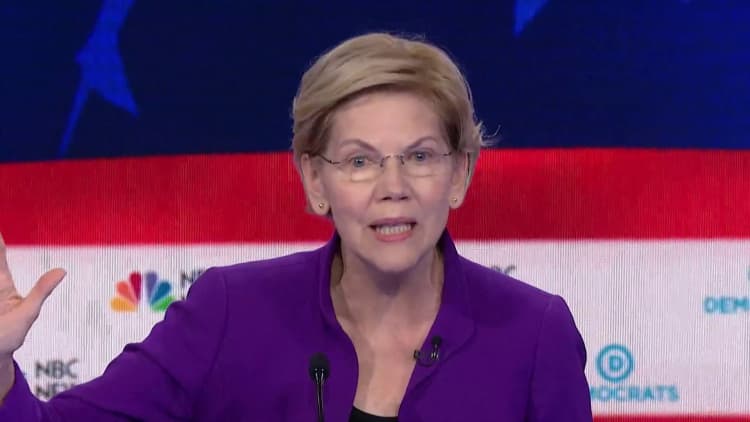
Ten Democratic candidates faced off for the first time Wednesday night in Miami, making repeated appeals to the working class and targeting corporations as they jockey for position in the 2020 presidential primary.
Some key business issues barely came up during the first Democratic debate. President Donald Trump's trade war with China and pledges to break up technology titans saw little or no mention during the two hours of debate.
But Democrats drilled into arguments that they are best equipped to boost the working and middle classes as they elbow to gain ground in a field of two dozen strong. From pledging to make opioid companies criminally liable, promising to reduce drug prices and proposing to take on corporate consolidation, the 2020 candidates kept up the scrutiny of corporate America and the wealthy that has marked the early days of the primary cycle.

From the start, contenders aimed to show how they could improve a solid U.S. economy earning strong marks from voters. Sen. Elizabeth Warren, D-Mass., called for "structural change" to improve a system she says benefits "giant" drug and oil companies but not consumers. Sen. Amy Klobuchar, D-Minn., said Trump "sits in the White House and gloats" while Americans struggle to afford college and health-care premiums.
Former Rep. Beto O'Rourke said he would reverse the 2017 GOP tax cuts and hike the corporate tax rate to 28% from the current 21% to pay for social programs. And Sen. Cory Booker, D-N.J., argued that indicators "from GDP to Wall Street's rankings is not helping people in my community."
Rep. Tim Ryan, D-Ohio, slammed General Motors for having the "audacity" to move car production to Mexico after getting a tax cut and a taxpayer bailout.
The first of two nights of debates showed a Democratic field itching to prove a populist bent in a party that has increasingly argued large corporations have prospered while consumers have suffered. And Warren — the highest polling candidate on stage Wednesday night who has pushed to break up companies from Amazon to Monsanto and tax wealth above $50 million — faced no direct attacks from her competitors.
Aseem Prakash, a University of Washington political science professor, said he saw inequality and the message of big corporations working against America as the main theme of the night. He called it a "serious problem" that "the rank and file of the Democratic Party want to hear." Prakash described the message "populism light."
The second of the two debate nights, hosted by NBC News, MSNBC and Telemundo, will take place 9 p.m. ET Thursday. ET. It will feature three of the race's top contenders in former Vice President Joe Biden and Sens. Bernie Sanders and Kamala Harris. Divisions have surfaced among those three candidates on economic issues from trade to health care.

One of Wednesday night's most consequential moments emerged from a health-care question. Warren and New York Mayor Bill de Blasio were the only candidates among the 10 who raised their hands when asked if they would scrap the private health insurance industry entirely in favor of a government-run plan.
Warren said she's "with Bernie [Sanders] on 'Medicare for All,'" a single-payer health care program. Transitioning to the system would have huge implications for not only health-insurance companies but also drugmakers.
Some of Warren's rivals pushed back on making a dramatic health-care overhaul. Klobuchar said she preferred a public option to let Americans choose whether to have Medicare. Former Rep. John Delaney said he wants to "keep what's working and fix what's broken," saying "100 million Americans say they like their private health insurance."
Even candidates who do not want to get rid of private insurance pushed for more scrutiny of drugmakers. Klobuchar called for lowering pharmaceutical prices, saying she wanted to allow Medicare to directly negotiate drug prices.
Booker argued that opioid makers "should absolutely be held criminally liable" for the nationwide crisis of addiction of overdoses.
The debate touched on an array of other issues. Former Housing and Urban Development Secretary Julian Castro hammered O'Rourke during a heated dispute over immigration. Candidates called for universal background checks and assault weapons bans to curb mass shootings. They pushed for action on climate change and renewable energy development.
While foreign policy discussion was limited, Democrats addressed how they would handle escalating tensions with Iran. Rep. Tulsi Gabbard, D-Hawaii, an Iraq War veteran, targeted Ryan after he incorrectly said the Taliban carried out the Sept. 11, 2001, attacks.
Still, the debate ended how it started. Warren finished her closing remarks with a message of trying to slash inequality and rein in corporations that several candidates laid out at the beginning of the debate.
"I am in this fight because I believe that we can make our government, we can make our economy, we can make our country work, not just for those at the top, we can make it work for everyone," she said.
Here are the participants for each debate night, listed in alphabetical order.
Wednesday
- Sen. Cory Booker, D-N.J.
- Former Housing and Urban Development Secretary Julian Castro
- New York Mayor Bill de Blasio
- Former Rep. John Delaney
- Rep. Tulsi Gabbard, D-Hawaii
- Washington Gov. Jay Inslee
- Sen. Amy Klobuchar, D-Minn.
- Former Rep. Beto O'Rourke
- Rep. Tim Ryan, D-Ohio
- Sen. Elizabeth Warren, D-Mass.
Thursday
- Former Vice President Joe Biden
- Sen. Michael Bennet, D-Colo.
- South Bend, Indiana, Mayor Pete Buttigieg
- Sen. Kirsten Gillibrand, D-N.Y.
- Sen. Kamala Harris, D-Calif.
- Sen. Bernie Sanders, I-Vt.
- Former Colorado Gov. John Hickenlooper
- Rep. Eric Swalwell, D-Calif.
- Author Marianne Williamson
- Entrepreneur Andrew Yang


